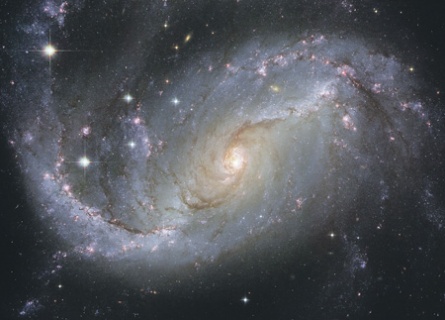
Even grandiose space objects retreat before the complexity of the molecule of heredity, DNA. Pixabay Photos
All (or almost all) cells of the human body have an identical genome. The total number of nucleotides (polymer molecules that make up our DNA) in 23 pairs of chromosomes is approximately 3.2 billion, that is, 3 x 109. The total number of cells in the human body is about 1014 (100 thousand billion). Thus, the total number of nucleotide pairs in the human body is, in order of magnitude, 1021 (100 billion billion).
How many nucleotides are synthesized in the human body per second? There are 31.5 million seconds in a year. Human life expectancy is less than 100 years. That is, a human life lasts no more than 3.15 x 109 (3 billion) seconds. We will assume that the cells in the human body are not updated. In fact, the receptor cells on the surface of the tongue, which help to distinguish the tastes of food, are renewed every 10 days; erythrocytes are renewed on average in 120 days; liver cells - in 300-500 days, and all cells of the human body, according to modern estimates, are updated every seven years.
 |
| The total length of DNA molecules in the human body exceeds the distance from the Earth to the Sun. Illustration Depositphotos/PhotoXPress.ru |
But even if we assume that cells, once created, do not renew themselves throughout life, we get the lower estimate of the number of nucleotides synthesized per second in the human body: 1021/(3 x 109) - more than 1011 nucleotides per second! That is, the number of nucleotides synthesized per second in the body of each person is more than 100 billion!
And now we take into account that the linear length of one nucleotide in the nucleic acid ln = 0.34 nm = 3.4 angstroms. Multiplying this figure by the number of nucleotide pairs in the human body, we get that the total length of double-stranded DNA in a living cell is about 1 m. Since each of the strands of double-stranded DNA is synthesized independently, each cell has an average of about 2 m of nucleotides. We accept the lower estimate - 1.5 m.
What is the total length of nucleotides in the human body? Multiplying 1.5 m by the number of cells (1014), we get that the total length of DNA in the human body is approximately 1011 km. For comparison: the distance from the Earth to the Sun is 150 million km (1.5 x 108 km). Thus, the total length of nucleotides synthesized in the human body is at least 100 more than the distance from the Earth to the Sun! Absolutely huge.
Since DNA performs extremely important functions in the body, being, in particular, a heredity molecule that transmits information for the synthesis of daughter cells from the mother, and in the process of sexual intercourse, paternal and maternal DNA are combined, an estimate of the total length of DNA in all people on Earth undoubtedly has meaning. The population of the Earth is now slightly less than 10 billion people, that is, on the order of magnitude of 1010. Thus, the entire humanity contains 1021 km of DNA.
Let's see how big this is. The size of our Galaxy, the Milky Way, is from 100 thousand to 200 thousand light years. A light year, the distance that light travels in 365 days, is approximately 10 trillion km (1013 km). Thus, the size of the Galaxy is about 1018 km. The total length of human DNA strands is two orders of magnitude (about 100 times) greater than the size of the Galaxy! In other words, we are talking about the fact that the total number of heredity molecules interacting with each other during the life of the biocenosis and the development of the organism is monstrously large.
So, let's remember the main numbers:
- in the human body, more than 100 billion (1011) heredity molecules are synthesized per second;
- the total length of DNA molecules in the body of one person is at least 1011 km, which is hundreds of times greater than the distance from the Earth to the Sun;
- the total human genome contains 1021 km of DNA, which is 100 times the size of the Milky Way;
- the total length of human DNA is increasing by more than 10 billion km per second, that is, the total rate of DNA synthesis of the human genome alone (without including DNA synthesis of other species participating in the Earth's biocenosis in this estimate) is 10 thousand times greater than the speed of light.
Of course, we are not talking about traveling with the help of a heredity molecule at a speed that is impossible according to the theory of relativity. We are talking about how powerful the processes of synthesis of the molecule of heredity in the biocenosis in general and in humanity in particular.
NY
 Life Science and Technologies
Life Science and Technologies